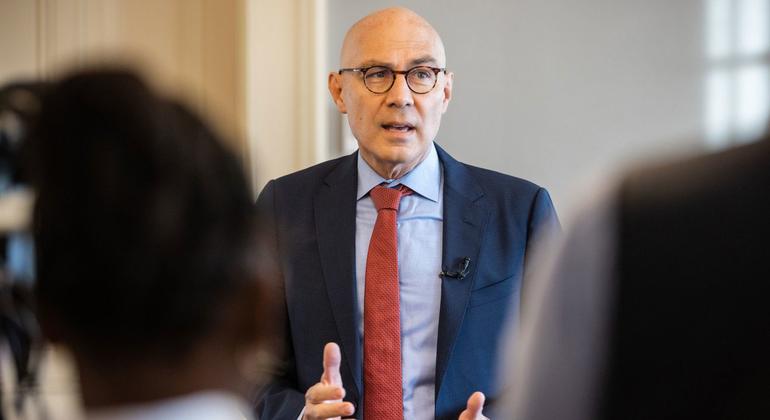Protests erupted two weeks ago, with students clashing with pro-government protesters and police in the capital Dhaka and other cities.
The Bangladesh government has closed all public and private universities following protests on Tuesday that left six people dead and dozens injured, according to media reports.
UN High Commissioner for Human Rights Volker Turk wrote on social media that all acts of violence or use of force, especially those resulting in loss of life, must be investigated and perpetrators held accountable.
“Freedom of expression and freedom of peaceful assembly are fundamental human rights,” he added.
The students are protesting against a quota system that allocates a third of government jobs to the children of veterans of Pakistan’s 1971 war of independence.
The quota was abolished in 2018 but was reinstated earlier this month.
South Sudan: Community-Based Militias Continue Attacks on Civilians
South Sudan continues to experience widespread attacks on civilians due to local armed violence, mainly involving community-based militias and civil defence groups, the United Nations Mission in the country (UNMISS) said in its latest quarterly report released on Wednesday.
From January to March, UNMISS recorded 240 incidents of violence affecting 913 civilians across the country.
Of these, 468 people were killed, 328 were injured, 70 were abducted and 47 were victims of conflict-related sexual violence. This represents a 24% increase compared to the 194 violent incidents reported in the same period in 2023.
The mission said inter- and intra-community violence perpetrated by community-based militias and civil defence groups remained the main cause of rural violence, accounting for 87 per cent of the victims, or 796 people.
In positive news, the report also shows that the number of recorded abductions fell by 30 percent compared to the fourth quarter of 2023 (from 100 to 70). Similarly, conflict-related sexual violence cases also fell by 25 percent, from 63 to 47.
Nicholas Haysom, head of the United Nations Mission in South Sudan (UNMISS), called for joint action by authorities and communities to peacefully resolve long-standing grievances, especially as South Sudan prepares to hold its first-ever elections in December.
“Building a culture of human rights is fundamental to achieving sustainable security, peace and democracy,” he said.

UNDP/Karin Schermbrucker (Courtesy of Slingshot)
Solar panels power a rural hospital in Bulawayo, Zimbabwe.
New UNDP report highlights opportunities for climate action in Africa
Also, the United Nations Development Programme (UNDP) launched the third edition of its Africa Investment Report, “Climate Opportunities,” on Wednesday at the Africa Impact Summit 2024 in Nairobi, Kenya.
The report outlines the economic, social and environmental private sector opportunities for sustainable development in Africa and presents data and trends on Sustainable Development Goals (SDGs) investments across the continent.
“Through the UNDP Africa Investment Insights Report, we are transforming Africa’s climate challenge into a private sector investment opportunity, building on the continent’s own ambitions embedded in national NDCs,” said Maxwell Gomera, Director of the UNDP Africa Sustainable Finance Hub.
Private Sector Opportunities
This third edition of the report focuses on climate-related investment opportunities using insights from the 16 Africa SDG Investor Map, in partnership with UNDP’s Climate Promise, to show how the private sector can support African countries’ Nationally Determined Contributions (NDCs) under the Paris Agreement.
The report highlights that climate action presents significant opportunities for the private sector, with more than half of the SDG investment opportunities identified in Africa contributing to climate action and NDCs.
Romera said UNDP is calling on investors to join in “realizing the opportunities for positive climate action.”



